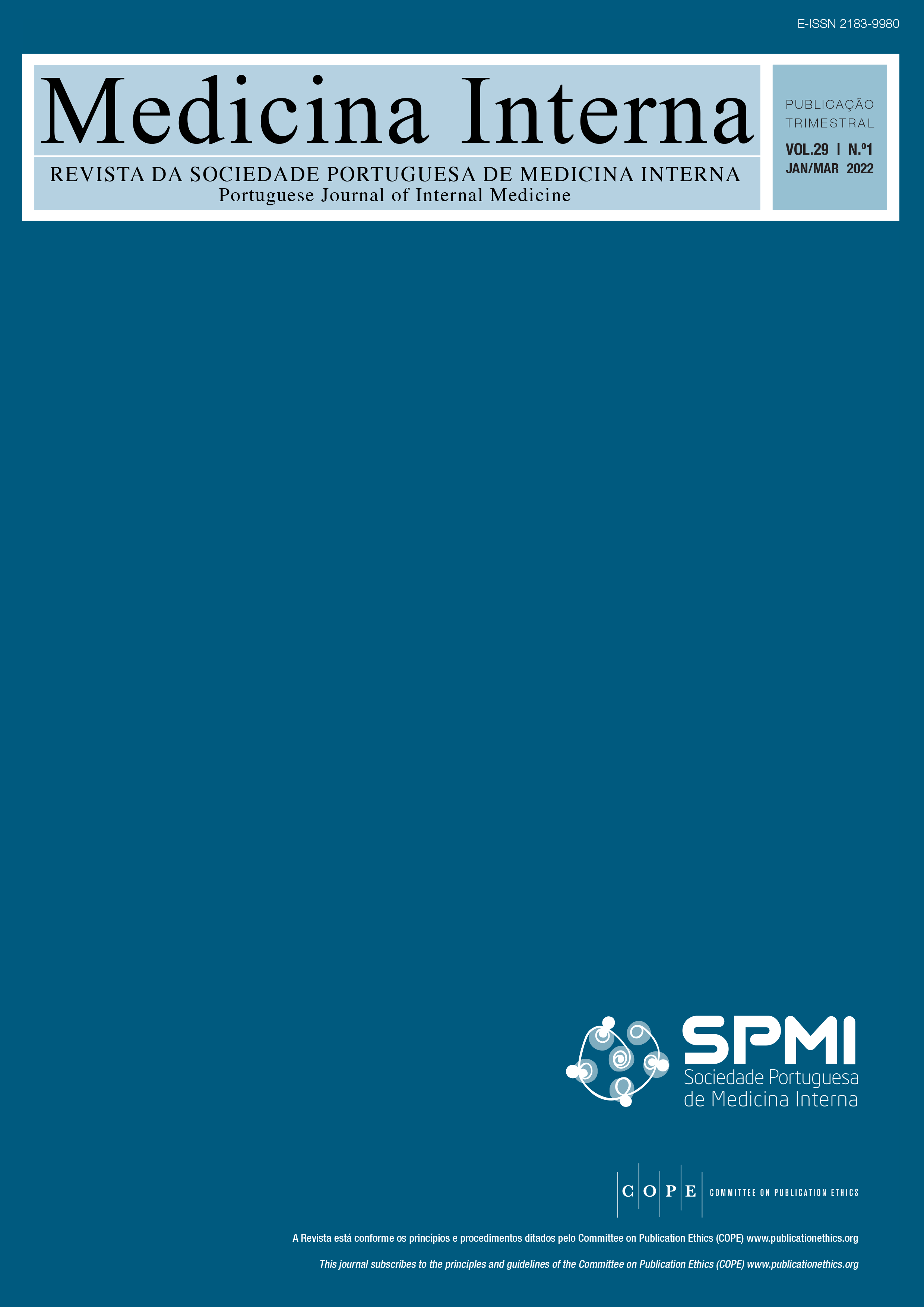Therapeutic and Prophylactic Indications for Use of Proton Pump Inhibitors and Inappropriate Prescribing
DOI:
https://doi.org/10.24950/rspmi.2022.01.192Keywords:
Inappropriate Prescribing, Proton Pump Inhibitors/therapeutic useAbstract
Introduction: Proton pump inhibitors represent one of the most prescribed drug classes, often maintained without reevaluation of the need for treatment. The goals for this study were to identify the therapeutic and prophylactic indications of use, analyze the demographic characteristics of patients and the relative frequency of inappropriate use.
Material and Methods: Retrospective, observational, cross-sectional study, which consulted the clinical files of patients admitted in Internal Medicine Services of a District Hospital from June to October 2020, and whose usual medication included a proton pump inhibitor.
Results: 76.4% of patients (n = 233) were under proton pump inhibitors with no indication.
Conclusion: The fact that they are not subjected to a prescription, contributed to their excessive and growing consumption without medical opinion. However, it is essential to evaluate the indications for treatment and inappropriate use as several studies have exposed potential adverse reactions associated with prolonged exposure.
Downloads
References
de la Coba Ortiz C, Argüelles Arias F, Martín de Argila de Prados C, Júdez Gutiérrez J, Linares Rodríguez A, Ortega Alonso A, et al. Proton-pump inhibitors adverse effects: a review of the evidence and position statement by the Sociedad Española de Patología Digestiva. Rev Esp Enferm Dig. 2016;108:207-24. doi: 10.17235/reed.2016.4232/2016.
Brayfield A. Martindale: The Complete Drug Reference. 38th ed. London: Pharmaceutical Press; 2014;
Nehra AK, Alexander JA, Loftus CG, Nehra V. Proton pump inhibitors: review of emerging concerns. Mayo Clin Proc. 2018;93:240-6;
Lehault WB, Hughes DM. Review of the long-term effects of proton pump inhibitors. Federal Practitioner. 2017;34:19-23;
WeMeRec Bulletin. Proton pump inhibitors. November 2015. https://www. wemerec.org/Documents/Bulletins/PPIBulletinOnline.pdf
Yadlapati R, Kahrilas PJ. When is proton pump inhibitor use appropriate? BioMed Central. 2017;15:36.
Comissão de Farmácia e Terapêutica da Administração Regional de Saude de Lisboa e Vale do Tejo.Boletim terapêutico nº 1/ Janeiro 2016. Lisboa: ARSLVT; 2016. /
Vilela S, Magalhães AL , Neto GA, Silva PI, Morais FG, Magalhães AC, et al. O uso de AINES, incluindo aspirina, na prevenção primária da toxicidade gastroduodenal. Brazil J Surg Clin Res. 2021;34:42-7.
Lanza FL, Chan FK, Quigley EM. Practice Parameters Committee of the American College of Gastroenterology. Guidelines for prevention of NSAID related ulcer complications. Am J Gastroenterol. 2009; 104:728.
Liu Y, Zhu X, Li R, Zhang J, Zhang F. Proton pump inhibitor utilisation and potentially inappropriate prescribing analysis: insights from a single- -centred retrospective study. BMJ Open. 2020;10:e040473. doi: 10.1136/ bmjopen-2020-040473.
Giannini EG, Crespi M, Djahandideh A, Demarzo MG, Moscatelli A, Bodini G, et al. Appropriateness of proton pump inhibitors treatment in clinical practice: prospective evaluation in outpatients and perspective assess ment of drug optimisation. Dig Liver Dis. 2020;52:862–8. doi: 10.1016/j. dld.2020.05.005
Thomas L, Culley EJ, Gladowski P, off V, Fong J, Marche SM. Longitudinal analysis of the costs associated with inpatient initiation and subsequent outpatient continuation of proton pump inhibitor therapy for stress ulcer prophylaxis in a large managed care organization. J Manag Care Pharm 2010;16:122–9. doi: 10.18553/jmcp.2010.16.2.122.
Schnoll-Sussman F, Niec R, Katz P. Proton Pump Inhibitors: The Good, Bad, and Ugly. Gastrointest Endosc Clin N Am. 2020;30:239251.
Kanno T, Moayyedi P. Proton Pump Inhibitors in the Elderly, Balancing Risk and Benefit: an Age-Old Problem. Curr Gastroenterol Rep. 2019;21):65. doi: 10.1007/s11894-019-0732-3.
Halfdanarson OO, Pottegard A, Bjornsson ES, Lund SH, Ogmundsdottir MH, Steingrímsson E, et al. Proton-pump inhibitors among adults: a nationwide drug-utlization study. Therap Adv Gastroenterol. 2018;11:1–11.
Farrell B, Pottie K, Thompson W, Boghossian T, Pizzola L, Rashid FJ, et al. Deprescribing proton pump inhibitors: evideice-based clinical practice guideline. Can Fam Physician. 2017;63:354-64.
Reimer C, Sondergaard B, Hilsted L, Bytzer P. Proton-pump inhibitor therapy induces acid-related symptoms in healthy volunteers after withdrawal of therapy. Gastroenterology. 2009;137:80-7.
Kahrilas PJ. Patient education: Gastroesophageal reflux disease in adults (Beyond the Basics). Uptodate [consultado Abril 2020] Disponível em: http://www.uptodate.com
Downloads
Published
How to Cite
Issue
Section
License

This work is licensed under a Creative Commons Attribution-NonCommercial 4.0 International License.
Copyright (c) 2023 Medicina Interna






